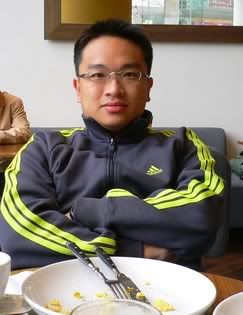And so it happened in Rwanda in April 1994. Apparently, genocide had been going on in the African nation even before 1994, but that fateful year was the worst: about 1 million people were murdered in just 100 days. Between then and now, it's been almost 15 years.
I met up some young officials from Rwanda a couple of weeks ago. They were here in Singapore to learn about urban planning and how Singapore has progressed as a nation for the past 40 years since independence. I lectured on transportation planning in Singapore. The initial template presentation on our ERP systems and uber high tech traffic systems was reviewed. I insisted that the gameplan was to focus on Singapore's growth through the years; a rags-to-riches story to put it loosely.
Through the entire process of preparing my presentation slides to the time the Rwandans left, I learned several things:
1. Singapore's history of her built environment can be understood by the chronological progress of urban planning. In a short span of 40 years since independence, her struggles and overall stability can be traced to good governance and political willpower to survive.
2. The Rwandans have the willpower and yearning to progress. They have seen it all and some have experienced the tumultous genocide times (the others who escaped to neighboring countries before 1994 have returned as Rwandans instead of Hutus or Tutsis). They want to make positive things happen to their country. I understand they have a young and pragmatic President in Paul Kagame.
3. The Rwandans practice the Gacaca (pronounced "gachacha") Court System, which is a traditional judicial system that was reinstated by the new Rwandan Patriotic Front (RPF) as a means to justly try the atrocities of the 1994 genocide. I understood from one of the Rwandan delegates that he is the guardian of 2 children whose parents are in prison for genocide. And these were the very parents who killed his family. I know, it's another unfathomable thought, but that's how the Rwandans want to reconcile and move on. Apparently it is part of the Gacaca system and our delegate friend has taken the liberty and responsibility to take care of his 2 charges, in the move to progess with the nation.
4. According to the delegates, Rwanda is now the safest country in Africa. Apparently 'one can walk in the middle of the night without fear'.
 Well, the delegation (including some mayors and top officials) has left and I reckon they've also learned alot from their experience in Singapore. The questions they posed to us were very real and one could sense a tinge of hope in their eyes after they've realised that Singapore could progress to today's current state in just 40 years. I actually managed to relate their current GDP status, which is almost to the GDP that Singapore had in the early 1970s. To put that in perspective, that's about the time when Singapore was at the infancy of her independence and nation building. Perhaps that's why the Rwandans have the glimmer of hope.
Well, the delegation (including some mayors and top officials) has left and I reckon they've also learned alot from their experience in Singapore. The questions they posed to us were very real and one could sense a tinge of hope in their eyes after they've realised that Singapore could progress to today's current state in just 40 years. I actually managed to relate their current GDP status, which is almost to the GDP that Singapore had in the early 1970s. To put that in perspective, that's about the time when Singapore was at the infancy of her independence and nation building. Perhaps that's why the Rwandans have the glimmer of hope.I guess it's now up to them to make it happen.

No comments:
Post a Comment